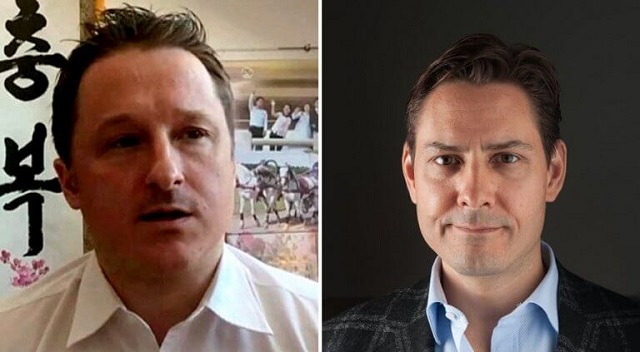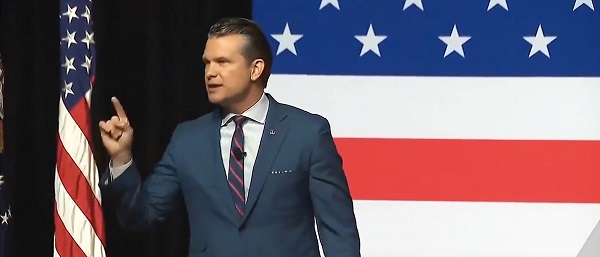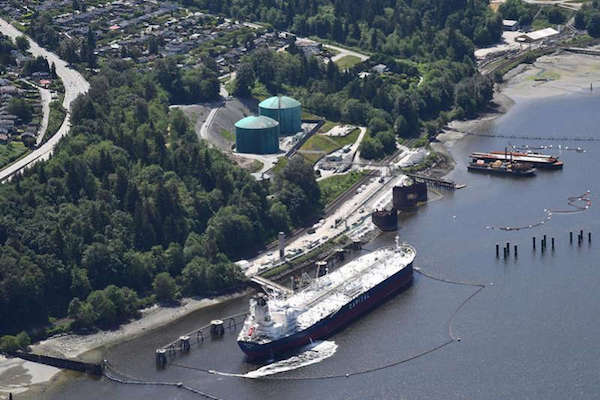Business
China likely to escape scot-free in persecution of two Canadians

From the MacDonald Laurier Institute
By Charles Burton
Beijing propagandists are already using recent claims to vindicate the appalling treatment of Michael Kovrig and Michael Spavor
There is a deep sadness to reports that Michael Spavor feels he was badly wronged by his fellow former political prisoner Michael Kovrig and, by extension, political officers at Canada’s embassy in Beijing and their masters in Ottawa.
Spavor reportedly wants millions in compensation from the Canadian government for its alleged complicity in his detention in his Chinese prison ordeal. If this ends up in court, Kovrig and his superiors would have an opportunity to defend themselves against these allegations, but Beijing propagandists are already using them to vindicate the appalling treatment of Kovrig and Spavor — a gross violation of international law — by a ruthless regime that arrested them to pressure Canada into releasing Chinese Communist Party figure Meng Wanzhou from house arrest in Vancouver.
While few specifics are known about Spavor’s claims, media reports depict a connection to Kovrig’s former job at Canada’s embassy in Beijing, and later with the International Crisis Group think tank, roles in which he would allegedly meet with people in China, engage them in his fluent Mandarin, and mine the conversations for nuggets of insight into China’s political or economic affairs.
Chinese authorities, of course, don’t like such activities. One expects that Kovrig and his superiors, both in government and the ICG, would have been well aware that this type of work would irritate Beijing, thus the danger of arbitrary detention on trumped-up charges was always there whenever he visited China without the protection of a diplomatic passport. And so it was.
One particularly troubling aspect of this sort of activity is the risk it presents to people who might unknowingly be sources for these information-gathering practices. Apparently Spavor and Kovrig routinely got together for drinks and sessions of good-humoured conversation. But friendships with diplomats imply that observations shared in a bar can end up the next morning in a report to Ottawa, and on to the Five Eyes. Was this possibility lost on Spavor? Was Kovrig perhaps not as forthcoming as he could have been about the full dimensions of their chats?
And there is always the possibility that China’s Ministry of State Security has access to Canadian diplomatic communications, which led them to open a file on the two.
Spavor ran a business, Paektu Cultural Exchange, that facilitated sports, cultural, tourism and business exchanges with North Korea. These pricey tours necessitated the transfer of badly-needed foreign currency into North Korea, arguably helping to enable the repressive Pyongyang regime. Perhaps more intriguing, in the course of his work Spavor developed an unlikely rapport with the third-generation Kim family dictator, Kim Jong Un, and was photographed jet-skiing and drinking cocktails with him on a private yacht. It is very plausible that China strongly disapproved of their junior proxy Korean communist dictator cavorting with non-Chinese foreign friends, hence his arrest.
Troublingly, Canadians — who were transfixed and infuriated by the two Michaels’ incarceration — have had little news about Kovrig and Spavor’s China nightmare since their sudden release in September 2021, just hours after Canada released Meng. One wonders if Ottawa really did enough to incentivize China’s Communist authorities to send them home sooner, or if there were other factors in Canada’s murky relationship with Beijing that took priority over what was perhaps downplayed behind closed doors as just another consular matter, one of many that are de facto subordinated to trade and political interests.
We may never see any Global Affairs Canada officials or former diplomats giving public evidence in a Canadian court to defend against Spavor’s accusation. To be sure, much of what goes on between Canada and China — indeed, within our own government internally — is kept from us by the secretive walls of the Security of Information Act.
Perhaps Spavor will be given a big whack of taxpayer money in an out-of-court settlement laced with ironclad nondisclosure provisions. One thing is for sure though. The Chinese authorities who so brutally persecuted him will, as usual, get off scot-free.
Charles Burton is a senior fellow at the Macdonald-Laurier Institute, non-resident senior fellow of the European Values Center for Security Policy in Prague, and former diplomat at Canada’s embassy in Beijing.
Agriculture
Why is Canada paying for dairy ‘losses’ during a boom?

This article supplied by Troy Media.
Canadians are told dairy farmers need protection. The newest numbers tell a different story
Every once in a while, someone inside a tightly protected system decides to say the quiet part out loud. That is what Joel Fox, a dairy farmer from the Trenton, Ont., area, did recently in the Ontario Farmer newspaper.
In a candid open letter, Fox questioned why established dairy farmers like himself continue to receive increasingly large government payouts, even though the sector is not shrinking but expanding. For readers less familiar with the system, supply management is the federal framework that controls dairy production through quotas and sets minimum prices to stabilize farmer income.
His piece, titled “We continue to privatize gains, socialize losses,” did not come from an economist or a critic of supply management. It came from someone who benefits from it. Yet his message was unmistakable: the numbers no longer add up.
Fox’s letter marks something we have not seen in years, a rare moment of internal dissent from a system that usually speaks with one voice. It is the first meaningful crack since the viral milk-dumping video by Ontario dairy farmer Jerry Huigen, who filmed himself being forced to dump thousands of litres of perfectly good milk because of quota rules. Huigen’s video exposed contradictions inside supply management, but the system quickly closed ranks until now. Fox has reopened a conversation that has been dormant for far too long.
In his letter, Fox admitted he would cash his latest $14,000 Dairy Direct Payment Program cheque, despite believing the program wastes taxpayer money. The Dairy Direct Payment Program was created to offset supposed losses from trade agreements like the Comprehensive Economic and Trade Agreement (CETA), the Comprehensive and Progressive Agreement for Trans-Pacific Partnership (CPTPP) and the Canada–United States–Mexico Agreement (CUSMA).
During those negotiations, Ottawa promised compensation because the agreements opened a small share of Canada’s dairy market, roughly three to five per cent, to additional foreign imports. The expectation was that this would shrink the domestic market. But those “losses” were only projections based on modelling and assumptions about future erosion in market share. They were predictions, not actual declines in production or demand. In reality, domestic dairy demand has strengthened.
Which raises the obvious question: why are we compensating dairy farmers for producing less when they are, in fact, producing more?
This month, dairy farmers received another one per cent quota increase, on top of several increases totalling four to five per cent in recent years. Quota only goes up when more milk is needed.
If trade deals had actually harmed the sector, quota would be going down, not up. Instead, Canada’s population has grown by nearly six million since 2015, processors have expanded and consumption has held steady. The market is clearly expanding.
Understanding what quota is makes the contradiction clearer. Quota is a government-created financial asset worth $24,000 to $27,000 per kilogram of butterfat. A mid-sized dairy farm may hold about $2.5 million in quota. Over the past few years, cumulative quota increases of five per cent or more have automatically added $120,000 to $135,000 to the value of a typical farm’s quota, entirely free.
Larger farms see even greater windfalls. Across the entire dairy system, these increases represent hundreds of millions of dollars in newly created quota value, likely exceeding $500 million in added wealth, generated not through innovation or productivity but by a regulatory decision.
That wealth is not just theoretical. Farm Credit Canada, a federal Crown corporation, accepts quota as collateral. When quota increases, so does a farmer’s borrowing power. Taxpayers indirectly backstop the loans tied to this government-manufactured asset. The upside flows privately; the risk sits with the public.
Yet despite rising production, rising quota values, rising equity and rising borrowing capacity, Ottawa continues issuing billions in compensation. Between 2019 and 2028, nearly $3 billion will flow to dairy farmers through the Dairy Direct Payment Program. Payments are based on quota holdings, meaning the largest farms receive the largest cheques. New farmers, young farmers and those without quota receive nothing. Established farms collect compensation while their asset values grow.
The rationale for these payments has collapsed. The domestic market did not shrink. Quota did not contract. Production did not fall. The compensation continues only because political promises are easier to maintain than to revisit.
What makes Fox’s letter important is that it comes from someone who gains from the system. When insiders publicly admit the compensation makes no economic sense, policymakers can no longer hide behind familiar scripts. Fox ends his letter with blunt honesty: “These privatized gains and socialized losses may not be good for Canadian taxpayers … but they sure are good for me.”
Canada is not being asked to abandon its dairy sector. It is being asked to face reality. If farmers are producing more, taxpayers should not be compensating them for imaginary declines. If quota values keep rising, Ottawa should not be writing billion-dollar cheques for hypothetical losses.
Fox’s letter is not a complaint; it is an opportunity. If insiders are calling for honesty, policymakers should finally be willing to do the same.
Dr. Sylvain Charlebois is a Canadian professor and researcher in food distribution and policy. He is senior director of the Agri-Food Analytics Lab at Dalhousie University and co-host of The Food Professor Podcast. He is frequently cited in the media for his insights on food prices, agricultural trends, and the global food supply chain.
Troy Media empowers Canadian community news outlets by providing independent, insightful analysis and commentary. Our mission is to support local media in helping Canadians stay informed and engaged by delivering reliable content that strengthens community connections and deepens understanding across the country.
Agriculture
Canadians should thank Trump for targeting supply management

This article supplied by Troy Media.
 By Gwyn Morgan
By Gwyn Morgan
Trump is forcing the Canadian government to confront what it has long avoided: an end to supply management
U.S. President Donald Trump’s deeply harmful tariff rampage has put the Canada-U.S.-Mexico Agreement (CUSMA) under renewed strain. At the centre of that uncertainty is Canada’s supply management system, an economically costly and politically protected regime Ottawa has long refused to reform.
Supply management uses quotas and fixed prices for milk, eggs and poultry with the intention of matching supply with demand while restricting imports. Producers need quota in order to produce and sell output legally. Given the thousands of farmers spread across the country, combined with the fact that the quotas are specific to milk, eggs, chickens and turkey, the bureaucracy (and number of bureaucrats) required is huge and extremely costly. Department of Agriculture and Agri-Food 2024-25 transfer payments included $4.8 billion for “Supply Management Initiatives.”
The bureaucrats often get it wrong. Canada’s most recent chicken production cycle saw one of the worst supply shortfalls in more than 50 years. Preset quota limits stopped farmers from responding to meet demand, leaving consumers with higher grocery bills for 11th-hour imports. The reality is that accurately predicting demand is impossible.
The dysfunction doesn’t stop with chicken. Egg imports under the shortage allocation program had already topped 14 million dozen by mid-year. Our trading partners are taking full advantage. Chile, for example, is on track to double chicken exports.
The cost to consumers is considerable. Pre-pandemic research estimates the average Canadian family pays $300 to $444 extra for food as a result of supply management. And since, as a share of their income, lower-income Canadians spend three times as much as middle-income Canadians and almost five times as much as upper-income Canadians, the impact on them is proportionally much greater.
It’s no surprise that farmers are anxious to protect their monopoly. In most cases, they have paid hefty sums for their quota. If the price of their product were allowed to fall to free-market levels, the value of their quota would go to zero. In addition, the Dairy Farmers of Canada argue that supply management means “the right amount of food is produced,” producers get a “fair return,” and import restrictions guarantee access to “homegrown food,” all of which is debatable.
All price-fixing systems create problems. Dairy cattle are not machines. A cow’s milk production varies. If a farmer gets more milk than his quota, the excess must be dumped. When governments limit the supply of any item, its value always rises. Dairy quotas, by their very nature, have become a valuable commodity, selling for more than $25,000 per “cow equivalent.” That means a 100-head dairy farm is worth at least $2,500,000 in quota alone, a value that exists only because of the legislated ability to charge higher-than-market prices.
Dairy isn’t the only sector where government-regulated quotas have become very valuable. The West Coast fishery is another. Commercial fishery quotas for salmon and halibut have become valuable commodities worth millions of dollars, completely out of reach for independent fishers, turning them into de facto employees of quota holders.
While of relatively limited national importance, supply management is of major political significance in Quebec. As George Mason University and Montreal Economic Institute economist Vincent Geloso notes, “In 17 ridings provincially, people under supply management are strong enough to change the outcome of the election.”
That brings us back to the upcoming CUSMA negotiations. Under CUSMA, the U.S. gets less than five per cent of Canada’s agricultural products market. Given that President Trump has been a long-standing critic of supply management, especially in dairy, it’s certain to be targeted.
Looking to pre-empt concessions, supply-managed farmer associations lobbied the federal government to pass legislation keeping supply management off the table in any future trade negotiations. This makes voters in those 17 Quebec ridings happy, but it’s certain to enrage Trump, starting the CUSMA negotiations off on a decidedly adversarial note. As Concordia University economist Moshe Lander says: “The government seems willing even to accept tariffs and damage to the Canadian economy rather than put dairy supply management on the table.”
Parliament can pass whatever laws it likes, but Trump has made it clear that ending supply management, especially in dairy, is one of his main goals in the CUSMA review. It’s hard to see how a deal can be made without substantial reform. That will make life difficult for the federal Liberals. But the president will be doing Canadian consumers a big favour.
Gwyn Morgan is a retired business leader who has been a director of five global corporations.
Troy Media empowers Canadian community news outlets by providing independent, insightful analysis and commentary. Our mission is to support local media in helping Canadians stay informed and engaged by delivering reliable content that strengthens community connections and deepens understanding across the country.
-

 Business1 day ago
Business1 day agoOttawa Pretends To Pivot But Keeps Spending Like Trudeau
-

 Daily Caller2 days ago
Daily Caller2 days agoParis Climate Deal Now Decade-Old Disaster
-

 Energy1 day ago
Energy1 day agoLiberals Twisted Themselves Into Pretzels Over Their Own Pipeline MOU
-

 Censorship Industrial Complex1 day ago
Censorship Industrial Complex1 day agoHow Wikipedia Got Captured: Leftist Editors & Foreign Influence On Internet’s Biggest Source of Info
-

 Indigenous2 days ago
Indigenous2 days agoResidential school burials controversy continues to fuel wave of church arsons, new data suggests
-

 Alberta2 days ago
Alberta2 days agoAlberta’s huge oil sands reserves dwarf U.S. shale
-

 International2 days ago
International2 days agoFBI didn’t think it had cause to raid Trump but DOJ did it anyway
-

 Daily Caller2 days ago
Daily Caller2 days agoHegseth Planning Huge Shakeup Of Top Military Command: REPORT









